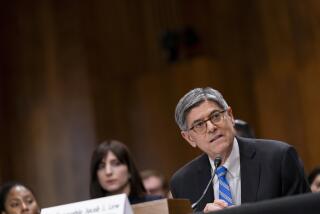Obama shakes up national security team
WASHINGTON — In filling two key positions on his national security team, President Obama on Wednesday elevated longtime loyal advisors known for advocating U.S. intervention for humanitarian missions overseas — in some cases more aggressively than the president has embraced.
Two years ago, Susan Rice and Samantha Power helped persuade Obama to take military action in Libya, where Moammar Kadafi was seeking to crush a rebellion that ultimately overthrew him.
But White House officials said Obama was not signaling an intent to move toward intervention in Syria when he announced that Rice would be his next national security advisor and Power would take her place as U.S. ambassador to the United Nations.
“I would simply say that the president’s policy on Syria will be the president’s policy as it is today,” White House Press Secretary Jay Carney told reporters. Neither Rice nor Power has publicly advocated intervention there.
One of the biggest changes could be stylistic. Rice is known, as the president joked, for “throwing the occasional elbow,” an approach that contrasts sharply with her low-key predecessor, Thomas Donilon.
The choice indicates Obama’s willingness to thumb his nose at congressional Republicans, who have blasted Rice for her role in the administration’s description of the Sept. 11 militant attack on the U.S. diplomatic outpost in Benghazi, Libya — a confrontation that sank her chances of becoming secretary of State. The Obama ally doesn’t need Senate confirmation to take on the powerful post as the chief White House advisor on national security.
Announcing his decisions in the Rose Garden, Obama praised Rice and Power for their commitment to human rights and democracy. Power, who until recently was a member of the national security staff at the White House, has shown that “the international community has a moral responsibility and a profound interest in resolving conflicts and defending human dignity,” Obama said. Rice “knows how to bring people together around a common policy and then push it through to completion so that we’re making a difference where it matters most.”
Both earned their reputations through experience and writings. As a national security staffer in the Clinton White House, Rice saw firsthand the consequences of that administration’s failure to intervene to stop the genocide in Rwanda. As a journalist, Power wrote extensively about the atrocities in Bosnia and Sudan. She won the Pulitzer Prize for her 2002 book on genocide.
Whether those views will lead them to take a similar view of Syria is unclear. And, on Wednesday, Obama seemed to downplay Rice’s reputation as an advocate for intervention. As he introduced Rice, Obama called her “passionate and pragmatic.”
“I think everybody understands Susan is a fierce champion for justice and human dignity,” the president said. “But she’s also mindful that we have to exercise our power wisely and deliberately.”
Some foreign policy analysts took Obama’s choices as a sign that nothing much would change in the administration’s approach, on Syria or anything else. Rice and Power are part of a long-standing coterie of close advisors who support the president’s decisions and don’t talk out of school about how he arrives at them.
“I don’t see a dramatic shift in the president’s position with these players,” said Heather Conley, senior fellow at the Center for Strategic and International Studies. “He has always liked a diversity of viewpoints, and he will spend his time listening to that debate. The positions have changed, but the people are the same, so the dynamic is the same.”
Rice’s promotion means she will become the most influential foreign policy advisor in a White House that has concentrated much of the decision-making under its own roof. She is known as a no-nonsense and passionate advocate. “She is fearless. She is tough,” Obama said.
Rice, 48, will replace a quieter figure. Donilon, a four-year veteran of Obama’s National Security Council, first as deputy and since 2010 as top advisor, was often focused on process and building consensus. A skilled Washington operator, he has been an internal advocate for turning the focus of U.S. foreign policy to Asia and urged caution as Obama contemplated the operation that killed Osama bin Laden.
Rice is set to take over this summer, and will arrive bearing the scars of her loyalty to the president as his lead spokesperson on the Benghazi attack. She has been sharply criticized by Republicans who contend the White House initially tried to cover up the role of terrorists in the attack two months before the presidential election.
Her involvement, and the possibility of an ugly Senate confirmation process, cost Rice the secretary of State job but bolstered her stock with the president.
Power will need Senate confirmation, and she quickly received support from at least one important Republican, indicating the process may not be a full-scale political fight. Sen. John McCain (R-Ariz.) issued a statement calling Power “well-qualified” and urging the Senate to move forward with her nomination.
Power, 42, is also a longtime advisor. After serving as a foreign policy aide in Obama’s Senate office, she went on to serve as a special assistant to the president and senior director for multilateral affairs and human rights.
Neera Tanden, president of the liberal think tank Center for American Progress, noted the president had taken heat for not naming more women to top posts in his administration.
“I’m excited there are two strong women who have a lot of experience and have been in the national security trenches for a long time,” she said. “I don’t view these as any kind of consolation prizes.”
kathleen.hennessey@latimes.com
More to Read
Start your day right
Sign up for Essential California for news, features and recommendations from the L.A. Times and beyond in your inbox six days a week.
You may occasionally receive promotional content from the Los Angeles Times.








